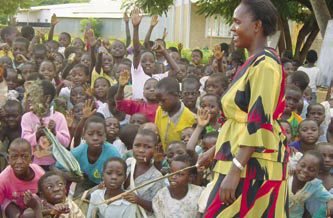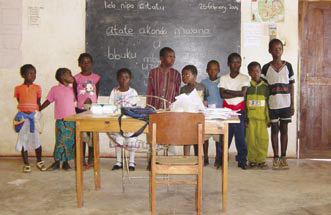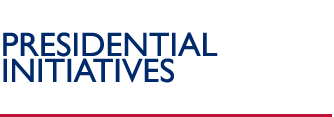Africa Education Initiative
 The Africa Education Initiative (AEI), announced by President Bush in June 2002, increases access to quality basic educational opportunities in Africa. AEI activities help improve primary education by providing teacher training, textbooks and other learning materials, support for community involvement, and scholarships to girls. AEI also seeks to address the impact of HIV/AIDS on schooling and the education system.
The Africa Education Initiative (AEI), announced by President Bush in June 2002, increases access to quality basic educational opportunities in Africa. AEI activities help improve primary education by providing teacher training, textbooks and other learning materials, support for community involvement, and scholarships to girls. AEI also seeks to address the impact of HIV/AIDS on schooling and the education system.
- 85,000 scholarships have been awarded to girls in 38 countries;
- Over 220,485 teachers in 15 countries have acquired new skills;
- Primary school children in Benin, Ethiopia, Guinea, Namibia, Senegal and South Africa have received 1,895,750 new textbooks.
- Over 13,000,000 African primary school children have improved learning environments.

AEI Offers Multifaceted Solutions to Malawi's Teaching Crisis
The Government of Malawi's 1994 Free Education for All policy led to a dramatic expansion in primary school enrollment, which jumped from 1.9 million to 2.8 million pupils. This aggravated Malawi's existing shortage of trained and qualified teachers, as well as the widespread lack of learning materials, classroom space, and classroom furniture. Very few primary school teachers have had formal education in primary school teaching methods; only 14 percent of Malawi's 46,000 teachers have a bachelor's degree in education. Currently, Malawi does not have the institutional capacity to provide the degree training associated with primary school teaching. Malawi thus needs a practical way to train new primary school teachers, as well as to further the professional development of experienced primary school teachers.
In response, AEI created a "smart classroom" at Mzuzu University to enable it to become a hub for distance teacher education. The "smart classroom" will also allow the university's educational research programs to become sustainable.
Stronger research programs (which the "smart classroom" will facilitate) should lead to an ethic of education program evaluation and build continuous policy assessment and program improvement into Malawi's public education system. AEI has also developed new social studies materials for grades 5-8 that will target 16,000 teachers. The materials include an activity-based teachers' orientation manual, created at an expert panel workshop, that focuses on issues such as HIV/AIDS awareness, democracy and human rights, gender rights, and drug and substance abuse. Moreover, the manual discusses participatory methods of teaching, lists teaching and learning resources, and describes assessment procedures. In this way, AEI is improving teaching methodologies and curriculum by developing and helping to implement hands-on, interactive approaches to teaching critical contemporary issues.
- Although announced in June 2002, initiative activities are still in the implementation phase; lessons learned have not yet been evaluated.
Note: Results for this initiative were reported through USAID's consolidated reporting system
Back to Top ^
|


